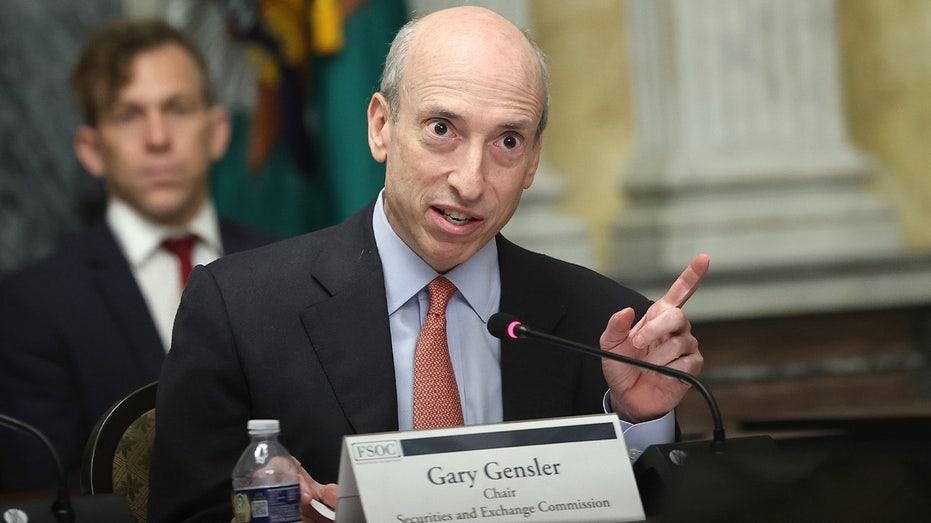Republican states unleash effort opposing SEC climate rule creating new type of company
'SEC and the NYSE are trying to implement a radical environmental agenda,' consumer group tells FOX Business
Tennessee AG sues Blackrock over claims it was misleading investors about ESG
Tennessee Attorney General Jonathan Skrmetti details his lawsuit against Blackrock on ‘Varney & Co.’
FIRST ON FOX: A coalition of 25 Republican state attorneys general are warning that a Securities and Exchange Commission (SEC) proposal paving the way for a new type of climate-focused company is unlawful and would pose a threat to consumers.
In a public comment letter Tuesday, the officials — led by Utah Attorney General Sean Reyes and Kansas Attorney General Kris Kobach — called for the SEC to rescind its proposal enabling the formation of so-called natural asset companies (NAC). They argued NACs may pose a threat to national security and subordinate the interests of millions of Americans "to the aims of environmental activists as well as to United Nations policies and mandates."
Under the proposed rule, the SEC would allow the New York Stock Exchange (NYSE) for the first time to list NACs, a new type of company that is chartered to "protect, restore and grow the natural assets under their management to foster healthy ecosystems," according to the Intrinsic Exchange Group (IEG), which collaborated with the NYSE to develop the new corporate taxonomy. If finalized, the rule would allow NACs to be traded publicly.
"Of all the objectionable and extreme policies in the ESG menagerie, NACs are among the most egregious and least defensible legally," Reyes said in a statement. "Not only do NACs suffer the same deficiencies as other ESG investments, but they represent a host of additional dangers to the American public."
BIDEN ADMIN APPEARS TO FABRICATE PAPER TRAIL IN PURSUIT OF MAJOR CHEMICAL PLANT SHUTDOWN: COURT DOCS

SEC Chairman Gary Gensler participates in a meeting of the Financial Stability Oversight Council at the U.S. Treasury July 28, 2023, in Washington, D.C. (Kevin Dietsch/Getty Images / Getty Images)
"NACs rely on unproven models focused not on returns and value for investors but rather restrictions of legal and productive use of natural resources, with dollars deployed in amorphous and undefined categories such as ‘natural assets’ and ‘ecosystem services,’" Reyes continued. "While masquerading as a novel tool for the public good, NACs are a brutish vehicle to accomplish an activist political agenda."
"They deprive public use of land in multiple ways that will further jeopardize US energy independence and grid stability while illegally opening management, use and ownership of these lands to private parties, including hostile countries or entities," he added. "As a group of concerned state regulators, we vehemently oppose the listing of NACs on the NYSE or any exchange."
In addition to Utah and Kansas, attorneys general from Alabama, Alaska, Arkansas, Florida, Idaho, Indiana, Iowa, Kentucky, Louisiana, Mississippi, Missouri, Montana, Nebraska, North Dakota, New Hampshire, Ohio, Oklahoma, South Carolina, Tennessee, Texas, Virginia, West Virginia and Wyoming also signed onto the effort Tuesday.
The comment letter comes less than a month after the SEC agreed to delay its rulemaking on the issue and allow stakeholders more time to weigh in on the proposal. The delay was requested by Republican state financial officers from 22 states who requested a "reasonable public comment process," instead of a rushed process.

Traders work on the floor of the New York Stock Exchange on Dec. 26 in New York City. (Spencer Platt/Getty Images / Getty Images)
"The attorneys general are absolutely correct when they say that the SEC and the NYSE are trying to implement a radical environmental agenda outside of the legislative process. This is the great scam of ESG that is being foisted on the American people, regardless of the harm it does to consumers or entire sectors of the economy," Will Hild, the executive director of watchdog group Consumers' Research, told FOX Business.
"The collusion between radical progressive groups like IEG and the government must be opposed vigorously," Hild said. "Kudos to AGs Reyes and Kobach and others who've called out this illegal proposed rule, which would have paved the way for a fraudulent, nonsensical scheme of assessing value."
According to NYSE — which argues that NACs "capture the intrinsic and productive value of nature and provide a store of value based on the vital assets that underpin our entire economy and make life on earth possible" — natural assets that could be grouped into a NAC include forests, wetlands and coral reefs, as well as working lands such as farms. NACs have also been supported by left-wing eco groups like the Rockefeller Foundation.
However, Republicans, like the attorneys general on Monday, and industry groups have sounded the alarm on the proposal, saying it would provide a pathway for locking up natural resources, like fossil fuels or minerals, harming local communities reliant on those activities.

Pump jacks operate in front of a drilling rig in an oil field in Midland, Texas. (REUTERS/Nick Oxford/File Photo / Reuters Photos)
"By authorizing the NYSE to list NACs on its exchange, the proposed rule provides a mechanism for companies whose purpose is not to make money, but instead to lock up land to prohibit productive economic uses thereof, to find investors and capital so they can obtain conservation leases and other 'ecological performance rights,'" the attorneys general wrote in their letter.
"The rule will enable private entities to lock up public lands in perpetuity, thereby depriving access to such lands for recreational purposes and for valuable — and in some cases essential — economic activities," they continued. "This includes agriculture, grazing, mining, logging, fossil fuel extraction, and any other activity that 'extract[s] resources without replenishing them.' Enabling private actors to cut off productive economic uses for public lands in perpetuity is not in the public interest."
CLICK HERE TO READ MORE ON FOX BUSINESS
They said the SEC proposal was intended to work in alignment with a Bureau of Land Management proposal that would allow environmental organizations that are opposed to fossil fuel drilling and mining projects to lease public land for conservation uses, thereby blocking resource development.
And the officials expressed concern that the SEC rulemaking would enable foreign actors to obtain a financial stake in American public lands.
"The proposed rule will enable foreign actors — including actors who may have goals directly contrary to America’s national security interests — to close off public lands for exploration and extraction of rare earth minerals. In this way as well, the proposed rule is contrary to the public interest," the letter stated.





















